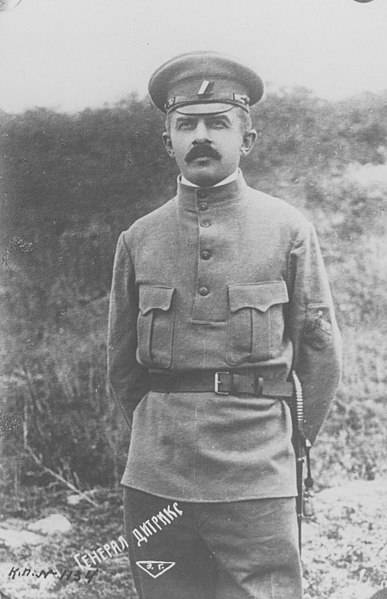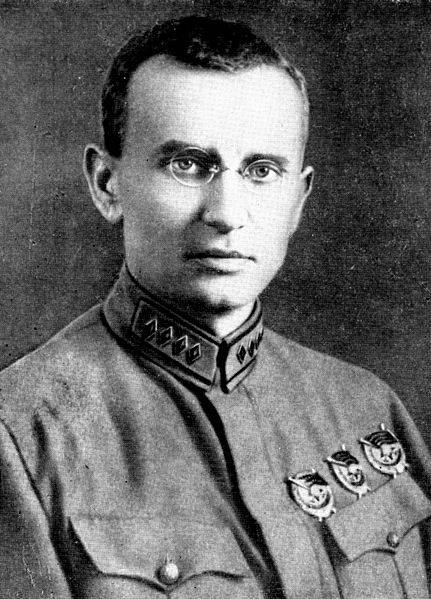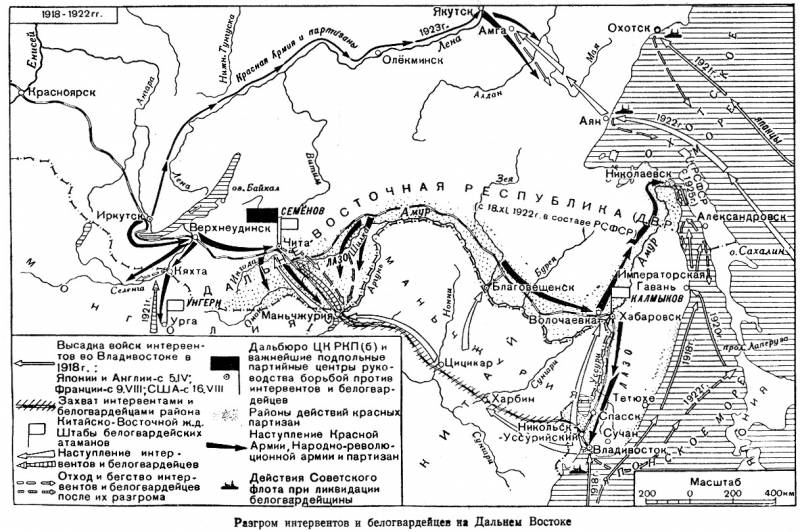The last offensive of the white army in Russia

Monument to the Fighters for Soviet Power in the Far East
The general situation in the summer-autumn of 1922
From the middle of 1922, the final stage of the struggle against the White Guards and interventionists in the Far East began. The situation in the region changed radically in favor of Soviet Russia. In February, the Whites were defeated near Volochaevka (Volochaev days. Assault on the "Far Eastern Verdun"). The Bolsheviks won in the European part of Russia and could concentrate their efforts on suppressing the last counter-revolutionary centers in the east of the country. The small white forces would have been crushed long ago, but the presence of the Japanese army in the Far East interfered.
However, the foreign policy situation was changing in favor of Soviet Russia. Moscow began to emerge from political isolation. European countries began to restore trade relations with Russia. The struggle for the Russian market began. Japan, which, as one of the great powers, continued to intervene on Russian soil, was left alone. The Japanese occupation in Primorye lost its formal justification, as it was carried out under the mandate of the Entente.
Relations between Soviet Russia and the United States have changed. Americans have long been consistent anti-communists. Before the revolution, America did not have special trade ties with Russia. But from the point of view of geopolitics, the Americans did not like both the dominance of Japan in the Russian Primorye and the claims of the Japanese in the Pacific Ocean.
The Washington Conference of 1921-1922 was of great importance. on the settlement of relations in the Pacific Ocean. The Western powers noticed that while they were fighting in Europe, the Japanese had taken a lot of things in the Asia-Pacific region. It was decided that Japan had drawn too large a zone of influence for itself: Japan itself, Korea, northeast China, Russian Primorye and Sakhalin. They decided to destroy this zone and reduce the excessive naval armaments of the Japanese Empire. The "Five Power Treaty" provided for an "open door policy" in China instead of a Japanese monopoly. Washington assumed the role of "peacemaker" and began to exert strong pressure on Tokyo, demanding the withdrawal of troops from Russia.
Japan could not pose an open challenge to the collective West, it had to yield. In addition, things were not going well for Tokyo inside the country. The economic crisis, huge spending on intervention - they reached 1,5 billion yen, human losses, low return on expansion into Russian lands caused a sharp increase in discontent in society. The "party of war" was losing supporters. The protest mood grew. In the summer of 1922, Japan founded its own Communist Party, which demanded that the intervention be curtailed. Also, various anti-war societies opposed the intervention in Russia, in particular, the Society for Rapprochement with Soviet Russia, the Non-Intervention Association, etc.
As a result, Takahashi's cabinet resigned. The military leadership has also changed. The new government was headed by Admiral Kato Tomosaburo, who represented the interests of the "Marine Party", which advocated the transfer of the center of gravity of the expansion of the Japanese Empire from the shores of Primorye to the Pacific Ocean, in a southerly direction. The Kato government issued a statement on the cessation of hostilities in Primorye.
On September 4, 1922, a new conference began in Changchun, which was attended by a joint delegation of the RSFSR and the Far East, on the one hand, and a delegation of the Empire of Japan, on the other. The Soviet delegation immediately presented the main condition for conducting further negotiations: to immediately clear all territories of the Far East from Japanese troops. The Japanese representative Matsudaira evaded a direct answer to this condition.
When the Soviet delegation decided to leave the conference, the Japanese reported that the issue of evacuating the army from Primorye had already been resolved. But Tokyo refused to withdraw troops from Northern Sakhalin. The Soviet side demanded the withdrawal of all forces from the territory of Russia. On September 19, negotiations were interrupted, then resumed and again interrupted on September 26.
Creation of Zemskaya rati
The situation in Primorye was still unstable. The Merkulov government lost the support of the local bourgeoisie, giving the Japanese the rights to the Ussuri railway, the port on Egersheld, Suchansky coal mines, the Far Eastern shipbuilding plant, etc. The Vladivostok Chamber of Commerce and Industry even demanded that all power be transferred to the People's Assembly, where left-wing delegates predominated. Also, the government had little control over the area outside the cities and railway stations. The partisans were the masters there.
Fermentation was also going on in the white camp. The Kappelites (fighters of Kolchak's former army) supported the People's Assembly, which demanded the overthrow of the Provisional Government. The Semenovites mainly supported the Merkulov brothers: Spiridon Merkulov was the head of government, Nikolai Merkulov served as Minister of Naval and Foreign Affairs). The government ordered the dissolution of the Chamber of Commerce and the People's Assembly.
The People's Assembly established its own government and decided to combine the functions of the head of the new government and the commander-in-chief of the armed forces of Primorye. In fact, it was about creating a military dictatorship. General Mikhail Diterikhs was invited to this post. He was the commander of the Siberian Army, the Eastern Front and the chief of staff of Admiral Kolchak. After the defeat of Kolchak, he left for Harbin. He was an ardent monarchist and a supporter of the revival of pre-Petrine social and political orders in Russia.
First, Diterichs held talks with the Merkulovs' cabinet and confirmed their power in the Amur Zemsky Territory. The People's Assembly was dissolved. On June 28, the Zemsky Sobor was convened. On July 23, 1922, at the Zemsky Sobor in Vladivostok, Diterikhs was elected the Ruler of the Far East and the Zemsky Voivode - the commander of the Zemsky army, formed on the basis of the White Guard detachments. Japan was asked weapon and ammunition, delaying the evacuation of the army. Diterichs announced a campaign against the DRV under the slogan "For Faith, Tsar Michael and Holy Russia."
As part of the general policy to restore the traditional way of life for Russia and the lack of manpower, the former army corps were renamed into groups, divided into regiments (detachments) formed from former brigades; former regiments were reduced to battalions and divisions (teams). To make up for the losses suffered by the troops on the territory of the region, the mobilization of the male population of young ages was announced. True, the mobilization as a whole failed (many young men fled to China or the countryside, went to Kamchatka, or bought foreign citizenship), as did the collection of donations from the propertied classes. There were almost no volunteers to join the army in crowded Vladivostok.
By September 1922, the Zemstvo army consisted of about 8 thousand soldiers, 24 guns, 81 machine guns and 4 armored trains. It consisted of the Volga group of General Molchanov (more than 2,5 thousand bayonets and sabers), the Siberian group of General Smolin (1 thousand people), the Siberian Cossack group of General Borodin (more than 900 fighters), the Far Eastern Cossack group of Glebov (more than 1 thousand people). human). There was also a reserve (more than 1,5 thousand people), various security, railway and technical units, units. The backbone of the last white army consisted of experienced cadres of the Kappel and Semenov troops, but there was no one to replace them. The Spassky fortified area was actively created.

General Mikhail Konstantinovich Diterichs during the Civil War
People's Revolutionary Army
Moscow was preparing to evacuate the Japanese. Instead of Blucher, Uborevich, commander of the 5th Army, was appointed Minister of War of the FER. The new commander arrived in Chita with his staff.
The NRA of the DRV was significantly strengthened. From the Consolidated and Chita brigades, the 2nd Amur Rifle Division was created as part of three regiments: the 4th Volochaev Order of the Red Banner, the 5th Amur and the 6th Khabarovsk. It also included the Troitskosava Cavalry Regiment, a light artillery battalion of 76-mm cannons with 3 batteries, a howitzer battalion of two batteries, and an engineer battalion. The commander of the 2nd Amur Rifle Division was simultaneously the commander of the Amur Military District, he was subordinate to the Blagoveshchensk fortified area, an armored train division (comprising three armored trains - No. 2, 8 and 9), aviation detachment and two border cavalry divisions. The Trans-Baikal Cavalry Division was reorganized into the Separate Far Eastern Cavalry Brigade.
The command reserve included the 1st Trans-Baikal Rifle Division, consisting of the 1st Chita, 2nd Nerchinsk and 3rd Verkhneudinsky regiments. By the beginning of the Primorsky operation, the regular units of the NRA numbered over 15 thousand bayonets and sabers, 42 guns and 431 machine guns. The NRA relied on human reserves and material assistance from the 5th Red Banner Army, located in Eastern Siberia and Transbaikalia.
Also, the partisan military regions were subordinate to the NRA command: Suchansky, Spassky, Anuchinsky, Nikolsk-Ussuriysky, Olginsky, Imansky and Prikhankaysky. They had at their disposal up to 5 thousand fighters. They were led by a specially created Military Council of Partisan Detachments of Primorye under the command of A.K. Flegontov, then he was replaced by M. Volsky.

Minister of War of the Far Eastern Republic and Commander-in-Chief of the People's Revolutionary Army and fleet DVR Ieronim Petrovich Uborevich
September offensive Zemskaya rati
The Japanese grouping in Primorye consisted of 3 divisions, more than 20 thousand people. The Japanese command, delaying time, carried out the evacuation slowly. Giving white the opportunity to strengthen and launch a counteroffensive. Parts of the Zemsky rati occupied the fortifications left by the Japanese, received part of the weapons and ammunition.
On September 1, 1922, the vanguard of the Zemskaya rati (the Volga group, supported by two armored trains) launched an offensive in the northern direction. The White Guards planned to capture the railway bridge across the Ussuri River in the area of st. Ussuri. The troops were advancing in two main directions: along the Ussuri railway and to the east of it - along the line of the settlements of Runovka - Olkhovka - Uspenka, then along the valley of the river. Ussuri on Tekhmenevo and Glazovka. In the second direction, White sought to go into the flank and rear of the enemy.
The NRA by this time had not yet concentrated its forces for the offensive. The red units were scattered over a vast area, covering the operational directions (Manchu and Ussuri) that were far from each other. The White Guards, having a numerical advantage, pushed back the Reds and on September 6 captured Art. Shmakovka and Uspenka. On September 7, after a fierce battle, the Reds retreated even further north to the Ussuri River to the Medveditsky-Glazovka line. At the same time, the Siberian Group and the Siberian Cossack Group of Generals Smolin and Borodin began hostilities against the partisans.
Soon the Reds regrouped, received reinforcements and counterattacked. On September 14, the Reds recaptured Art. Shmakovka and Uspenka. As a result, White actually returned to his original positions. The command of the Zemskaya rati did not have sufficient forces and reserves to develop the first successes. Having received information that the enemy began to concentrate forces in Primorye, the Whites went on the defensive.
On September 15, Diterikhs held the Far Eastern National Congress in Nikolsk-Ussuriysky. He urged "to give a decisive battle to the communists on the last free piece of land" and asked the Japanese not to rush to evacuate. A special body, the Council of the Congress, was elected to help the commander. General mobilization began, an emergency tax was introduced for the needs of the army. Another operation against the partisans began to provide the rear of the army. None of the measures have been fully implemented. The people were in no hurry for a "decisive battle", the bourgeoisie did not give money, the partisans were not defeated.
By the beginning of October 1922, the Zemstvo army consisted of about 15,5 thousand bayonets and sabers, 32 guns, 750 machine guns, 4 armored trains and 11 aircraft. Its arsenals and stocks were replenished at the expense of the Japanese army.
Beginning of the Primorsky operation
By the end of September 1922, units of the 2nd Amur Division and the Separate Far Eastern Cavalry Brigade were located in the area of st. Shmakovka and Art. Ussuri. They formed a strike force under the overall command of the commander of the 2nd Amur Division Olshansky (in early October he was replaced by Pokus). The 1st Trans-Baikal Division, following the railroad in echelons and along the Amur and Ussuri rivers on steamboats, passed Khabarovsk and moved south. This division became the reserve of the NRA.
At the first stage, the Reds were going to defeat the Volga group of Whites in the area of st. Sviyagino. The advanced forces of the enemy were not supposed to retreat to Spassk, strengthening its defenses. Then the NRA, with the support of the partisans, was going to take Spassk and continue the offensive to the south. The blow was delivered by two shock groups:
1) A separate Far Eastern Cavalry Brigade and the 5th Amur Regiment advanced around the railway from the east;
2) The 6th Khabarovsk Rifle Regiment and the Troitskosavsky Cavalry Regiment with a light artillery battalion and two armored trains attacked along the Ussuri railroad. The rest of the units were in reserve.
The partisans of Volsky, who were reinforced by a special detachment under the command of Gyultshof, were given the task of defeating the enemy troops stationed in the Anuchino-Ivanovka area at all costs. Then advance in the general direction to st. Flour and go to the rear of the Spasskaya group of whites. Also, the partisans were supposed to disrupt the railway traffic behind enemy lines.

To be continued ...
Information